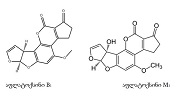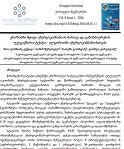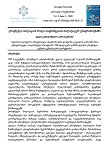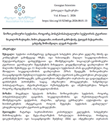Problems of managing valuable natural wetlands in south-eastern Poland on the example of selected peatland reserves
The article is published within the Batumi International Conference - "Study, Protection, Preservation, Wise Use of Separate Components of Biodiversity".
Downloads
Contemporary processes of anthropogenic transformation of the environment overlap with global problems related to climate change. These phenomena affect, among others, water resources and make the current methods of water management no longer correspond to current conditions. Research on the water balance of protected areas allows not only to properly plan changes in the method of water resource protection but also to link them with the protection of disappearing natural habitats and species. It was assumed that the specific alimony catchment area remains without influences from the environment, and the amount of water retained by substrates other than peat is omitted due to their high infiltration coefficient. The water balance equation was used in the calculations, where: Inflow - [P + Hdp + ∆hg], Outflow = Retention [P + Hdp + ∆hg] - [E + Ho + ∆h'g] = +/- R, P - precipitation on the surface, Hdp - surface inflow of water from the catchment area, ∆hg - underground inflow, E - evaporation from the surface, Ho - surface runoff of water, ∆h'g - underground runoff, R - retention (water retained in peats). The values of evaporation and precipitation were assumed according to the current and available data of the Institute of Meteorology and Water Management. Vegetation studies were conducted based on the classic Braun-Blanquet phytosociological method [1]. Analysis and characterization of peatland habitats were adopted by the monitoring manuals [2, 3]. Three nature reserves located in southeastern Poland, in the Podkarpackie and Lublin voivodeships, were selected as research areas. The selected reserves are characterized by great spatial diversity and protect a wide spectrum of peatland vegetation. The obtained results allow us to indicate peat bog areas as important in contemporary planning of water resources protection, however, due to the number of impacts to which they are subject, it is necessary to ensure an appropriate level of financing for nature protection so that it is possible to simultaneously protect natural habitats important for the European Union. The work carried out is part of the protection plans for the nature reserves mentioned above [4, 5, 6].
Downloads
Dzwonko Z. 2007. Przewodnik do badań fitosocjologicznych. Wydawnictwo SORUS. Poznań – Kraków, ss. 308.
Mróz W. (red.) 2010. Monitoring siedlisk przyrodniczych. Przewodnik metodyczny. Cz I. GIOŚ, Warszawa.
Mróz W. (red.) 2012. Monitoring siedlisk przyrodniczych. Przewodnik metodyczny. Część III. GIOŚ, Warszawa.
Wróbel D., Czyżowicz S., Halama M., Piegdoń A., Topolski K. 2021. Plan ochrony dla rezerwatu przyrody „Źródła Tanwi”, mscr., pp. 261.
Wróbel D., Czyżowicz S., Halama M., Szymczyk R., Topolski K., Wziątek B., Zubel R. 2022. Plan ochrony dla rezerwatu przyrody „Imielty Ług”, mscr., pp. 560.
Wróbel D., Czyżowicz S., Halama M., Szymczyk R., Topolski K., Wziątek B., Zubel R. 2022. Plan ochrony dla rezerwatu przyrody „Piskory”, mscr., pp. 264.
Copyright (c) 2024 Georgian Scientists

This work is licensed under a Creative Commons Attribution-NonCommercial-NoDerivatives 4.0 International License.


























































































































































































































